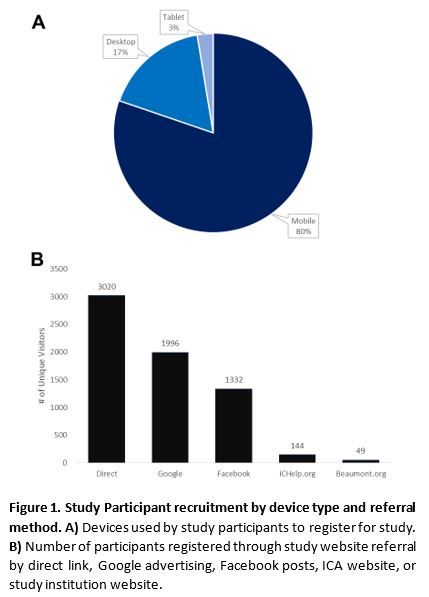Back
Poster, Podium & Video Sessions
Moderated Poster
MP30: Global Health/Humanitarian
MP30-07: Conducting Urology Research during COVID-19: Social Media-Based Crowdsourcing of Urine Samples for Biomarker Development
Saturday, May 14, 2022
1:00 PM – 2:15 PM
Location: Room 222
Elijah Ward*, Sarah Bartolone, Alexander Varabulea, Joseph Janicki, Hannah Peters, kenneth Peters, Royal Oak, MI, Nitya Abraham, Melissa Laudano, New York, NY, Christopher Smith, Houston, TX, Bernadette Zwaans, Michael Chancellor, Royal Oak, MI, Laura Lamb, Ann Arbor, MI
- EW
Poster Presenter(s)
Introduction: Conducting research during the COVID-19 pandemic remains a challenge for the entire urologic community. We hereby report our effort to use social media-based crowdsourcing methodology to recruit participants from the entire United States, including Alaska and Hawaii. We developed a novel research model that can engage multiple stakeholders and allows for fast and broad participation for urine biomarker development towards a diagnostic tool for Interstitial Cystitis (IC).
Methods: We partnered with a patient advocacy group, the Interstitial Cystitis Association (ICA), to aid in recruitment efforts. A website with study information and links to the HIPAA-compliant enrollment questionnaire was created. The study was advertised though Google, and Beaumont’s and ICA’s social media using Twitter, emails, YouTube videos, Facebook posts, websites, and TikTok. Enrolled participants were shipped at-home collection kits containing urine cups with preservative, a prepaid return mailing envelope, instructions, and survey materials.
Results: National public participation was strong, and enrollment was closed within three months. Men and women of all age groups and ethnicities enrolled in the study, representing all 50 United States. Currently, 1,211 crowdsourced samples have been returned, including 677 asymptomatic control samples. Surprisingly, most participants accessed the website via mobile devices, as opposed to via desktop computer or tablet. Potential participants were referred to the website primarily by direct links (i.e. email links), with other referring sites being Facebook, Google Advertisements, the ICA’s website, and Beaumont Hospital’s website.
Conclusions: Following COVID-19 safety guidelines, we conducted a nationwide crowdsource collection of urine samples. Social media and web-based recruitment tools were used to recruit participants. Having a website user-friendly on mobile devices was essential. Nontraditional recruitment methods, such as TikTok videos, encouraged study participation. Utilizing various social media platforms, it is possible to crowdsource urine samples from across the United States quickly, economically, and most importantly during the COVID-19 pandemic, safely.
Source of Funding: This work was supported by the Office of the Assistant Secretary of Defense for Health Affairs through the Technology/Therapeutic Development Research Program under Award No. W81XWH-19-1-0288. The opinions, interpretations, conclusions, and recommendations are those of the authors and are not necessarily endorsed by the Department of Defense.

Methods: We partnered with a patient advocacy group, the Interstitial Cystitis Association (ICA), to aid in recruitment efforts. A website with study information and links to the HIPAA-compliant enrollment questionnaire was created. The study was advertised though Google, and Beaumont’s and ICA’s social media using Twitter, emails, YouTube videos, Facebook posts, websites, and TikTok. Enrolled participants were shipped at-home collection kits containing urine cups with preservative, a prepaid return mailing envelope, instructions, and survey materials.
Results: National public participation was strong, and enrollment was closed within three months. Men and women of all age groups and ethnicities enrolled in the study, representing all 50 United States. Currently, 1,211 crowdsourced samples have been returned, including 677 asymptomatic control samples. Surprisingly, most participants accessed the website via mobile devices, as opposed to via desktop computer or tablet. Potential participants were referred to the website primarily by direct links (i.e. email links), with other referring sites being Facebook, Google Advertisements, the ICA’s website, and Beaumont Hospital’s website.
Conclusions: Following COVID-19 safety guidelines, we conducted a nationwide crowdsource collection of urine samples. Social media and web-based recruitment tools were used to recruit participants. Having a website user-friendly on mobile devices was essential. Nontraditional recruitment methods, such as TikTok videos, encouraged study participation. Utilizing various social media platforms, it is possible to crowdsource urine samples from across the United States quickly, economically, and most importantly during the COVID-19 pandemic, safely.
Source of Funding: This work was supported by the Office of the Assistant Secretary of Defense for Health Affairs through the Technology/Therapeutic Development Research Program under Award No. W81XWH-19-1-0288. The opinions, interpretations, conclusions, and recommendations are those of the authors and are not necessarily endorsed by the Department of Defense.

.jpg)
.jpg)